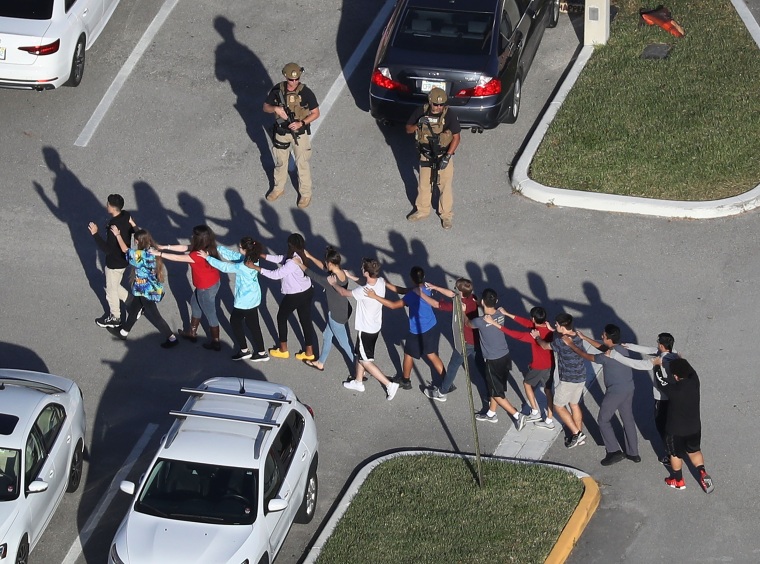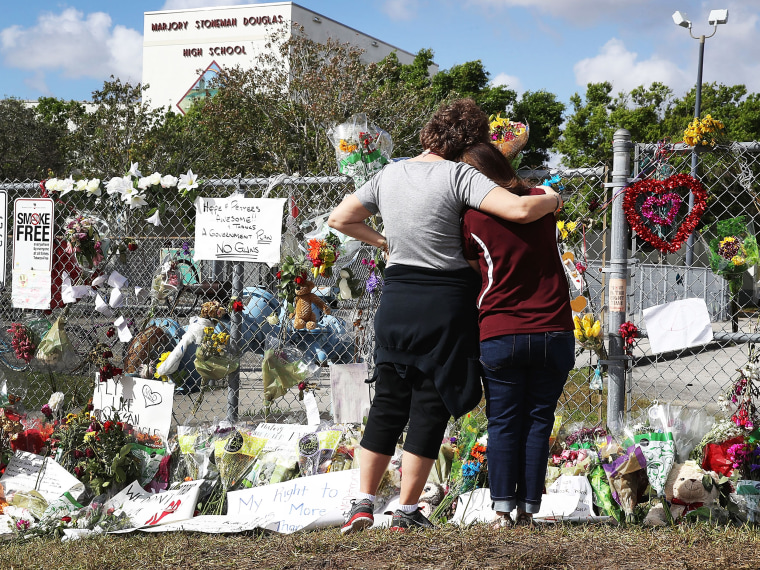A jury on Thursday spared Parkland, Florida, school shooter Nikolas Cruz from the death penalty, recommending that he be sentenced to life in prison without parole for the 2018 Valentine’s Day massacre at Marjory Stoneman Douglas High School that left 14 students and three staff members dead.
The 12-person jury's recommendation was read in a packed courtroom before visibly distraught family members and the shooter, who remained blank-faced throughout.
The jury reached its decision after more than a day of deliberations, nearly capping the exhaustive trial that saw jurors review graphic videos and photos from the shooting, tour the high school left practically untouched since the massacre, and hear emotional testimonies of victims’ family members.
Prosecutors had sought the death penalty, while the defense had asked for life in prison. The jury had to reach a unanimous decision for the death sentence.
Aspects of Cruz’s life were factors in the jury's decision
Judge Elizabeth Scherer read through the verdict forms — a total of 17, one for each victim.
The jury recommended life without the possibility for parole on all counts. The decision means that the jury could not unanimously agree that the gunman should be executed for killing at least one victim.
However, the jury did find that there were aggravating factors that could warrant the death sentence, but that they did not outweigh the mitigating circumstances.
Those mitigating factors, the defense had argued, include the shooter's birth mother’s alcohol use, his adoptive parents' failure to get him proper psychiatric care and his admission of guilt.
Family members of the victims were visibly emotional, some shaking their heads and others wiping tears.
Lori Alhadeff, the mother of Alyssa Alhadeff, dropped her head into her hand as the verdict related to her daughter was read.
The judge cannot overrule the jury's verdict under Florida law.
The shooter's sentencing is scheduled for Nov. 1 — at which time a formal ruling will be issued. It was delayed after the state argued that the surviving victims of the Parkland shooting have the right to express themselves and say what they could not during victim impact statements prior to a sentence being announced.
Families of victims say the jury 'failed'
Following the verdict, Alyssa's parents denounced the jury's recommendation.
“We are beyond disappointed with the outcome today. This should have been the death penalty 100%,” said Lori Alhadeff, who has a “Live for Alyssa” tattoo on her arm.
"I sent my daughter to school and she was shot eight times. I am so beyond disappointed and frustrated with this outcome. I just don’t understand this," she said.

Her husband, Ilan Alhadeff, said, “The jurors let us down.”
“I am disgusted with our legal system. I am disgusted with those jurors,” he said. “I pray that that animal suffers every day of his life in jail, and he should have a short life.”
He said that the jury's decision sets a precedent for other mass shooters, adding, "He should have been given the death penalty from the get-go."
Max Schachter, the father of victim Alex Schachter, 14, tweeted that the gunman "got everything he wanted" with the verdict, "while our loved ones are in the cemetery."
Tony Montalto, the father of victim Gina Montalto, 14, said the aggravating factors in the case should have outweighed the mitigating factors.
"Seventeen beautiful lives were cut short by murder — heinous, prepared, torturous murder. And the monster that killed them gets to live another day," he said.
Fred Guttenberg, the father of Jaime Guttenberg, 14, said his daughter was shot running down a hallway and no mitigating factors could have weighed against that.
"This jury failed our families today," he said. "I don't know how the jury came to their conclusion today but 17 families did not receive justice."
He said upon realizing the verdict, he looked at his wife and said "shame."
“Anger, devastation ... I've spent almost the past five years preparing myself for today."
Anne Ramsay, the mother of Helena Ramsay, 17, said: “We should’ve had the death sentence given out today because he took 17 lives and attempted to take 17 more and it could’ve even been more, and he planned it meticulously.”
Noting examples of innocent Black men who are “mowed down all the time,” she said the jurors allowed the Parkland shooter to live.
"He got away with it today," she said.
A woman who identified herself as Helena's cousin said she felt the defense “guilt-tripped” the jury out of the death penalty.
“But they’re not realizing that we have to live with this, we have to live with not having Helena in our lives," the woman, who did identify herself, said. "He doesn’t deserve mercy or grace. He’s allowed to breathe and have three meals a day. Where is my cousin? She’s not here."
Linda Beigel Schulman, the mother of slain teacher Scott Beigel, asked: “If this was not the most perfect death penalty case, then why do we have the death penalty at all?”
Debbi Hixon, the widow of Chris Hixon, a teacher who ran into the school to try and stop the shooter, also had sharp words after the trial results.
"This verdict to me, what it says to me, what it says to my family, what it says to the other families, is that his life meant more than the 17 that were murdered, and the 17 that were shot, and the thousands of people in that school, in that community that are terrorized and traumatized every single day.”
Broward County Public Schools issued a statement in light of the verdict, saying mental health professionals will be provided at each school.
The three-month trial
On Valentine’s Day 2018, the gunman, then 19, stormed the high school wielding an AR-15-style rifle and released a spray of bullets.
He pleaded guilty last October to murdering 14 students and three staff members in the massacre.
The victims in the shooting were: Alyssa Alhadeff, 14, Scott Beigel, 35, Martin Duque, 14, Nicholas Dworet, 17, Aaron Feis, 37, Jaime Guttenberg, 14, Chris Hixon, 49, Luke Hoyer, 15, Cara Loughran, 14, Gina Montalto, 14, Joaquin Oliver, 17, Alaina Petty, 14, Meadow Pollack, 18, Helena Ramsay, 17, Alex Schachter, 14, Carmen Schentrup, 16, and Peter Wang, 15.
During closing arguments Tuesday, defense counsel Melisa McNeill told the jury before they started deliberations: “One day I promise you, you will ask yourself, did I make the right decision? You will never forget voting for life.”

Lead prosecutor Mike Satz concluded the state’s closing arguments by emotionally reading each victim’s name saying, “The appropriate sentence for Nikolas Cruz is the death penalty.”
The lengthy trial saw prosecutors call witnesses who recalled seeing students and staff members die and argue that the gunman had displayed racist and misogynistic behavior online prior to the massacre. Violent writings and drawings were found in his jail cell in the spring.
The defense argued that his birth mother’s alcohol abuse during her pregnancy led to his erratic and violent behavior.
In a rare move, jurors in August visited the site of the massacre, where nothing had been changed from that deadly day more than four years ago, except for the removal of the victims’ bodies and some personal items. They walked past dried Valentine's Day rose petals scattered on classroom floors, large pools of dried blood and bullet-riddled walls.
'I didn't have anyone else to kill'
In the trial, forensic psychiatrist Dr. Charles Scott testified for the state that the gunman meets the criteria for a diagnosis of antisocial personality disorder, meaning he showed no regard for right and wrong, and there was evidence showing he knew what he was doing.
“So, it’s not that he didn’t know or understand that. He did,” Scott said, NBC Miami reported. “It’s just that [people] with a social personality disorder, they don’t care.”
In Scott's chilling testimony Oct. 4, he spoke of his jailhouse interview with the shooter, who told him he ended the shooting because “I didn’t have anyone else to kill.”
The trial also saw tension between the defense and Scherer in which the gunman's attorneys filed a motion for her to step down, accusing her of being biased, but she refused.
The motion came after Scherer rebuked lead defense attorney Melisa McNeill and her team outside of the jury’s presence, accusing them of being “unprofessional” when they unexpectedly rested their case after only about 25 of the 80 witnesses they initially intended to testify had been called.